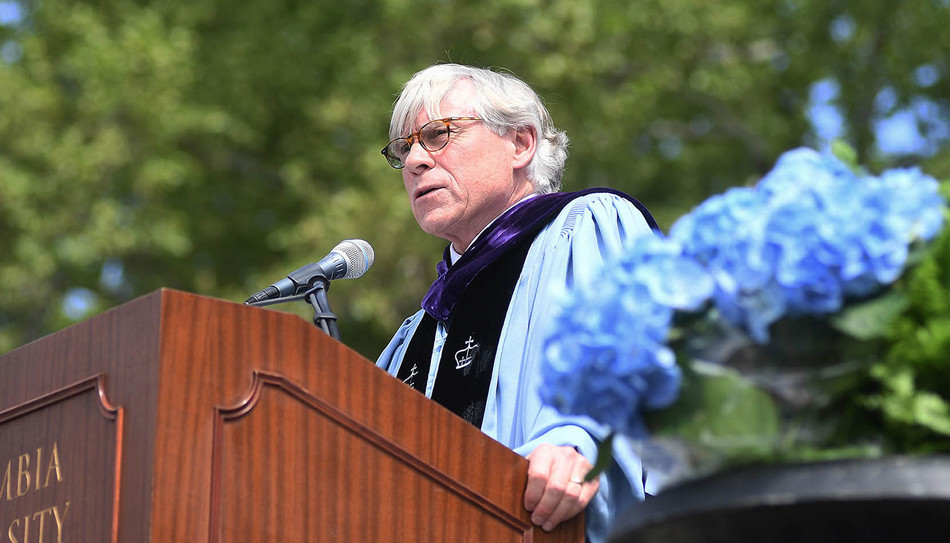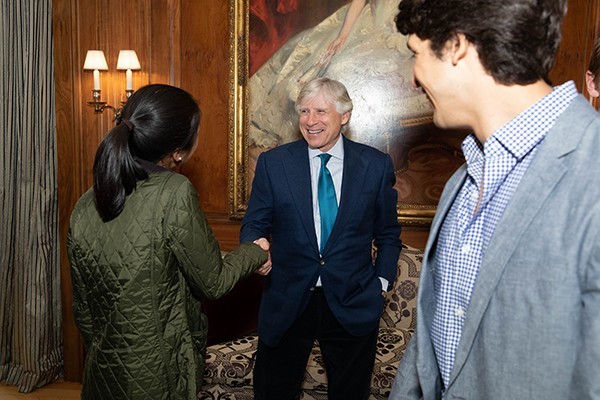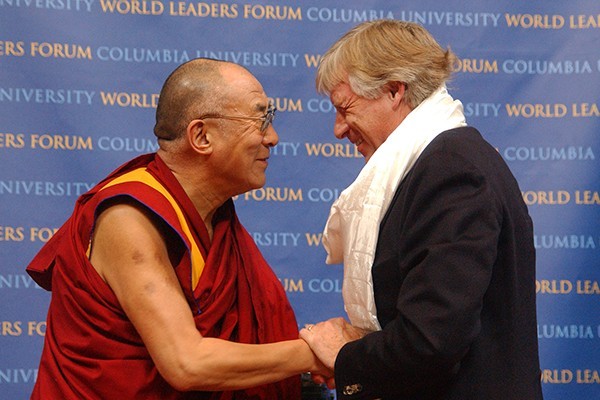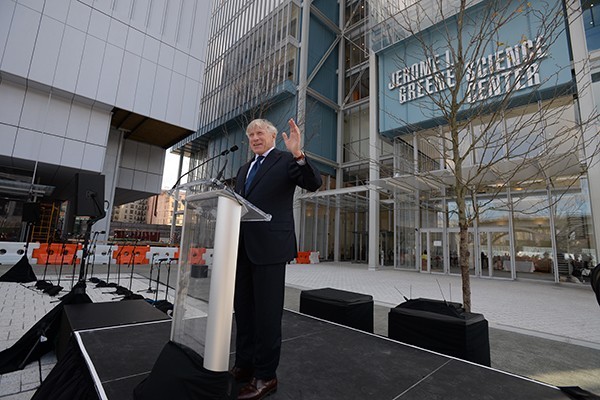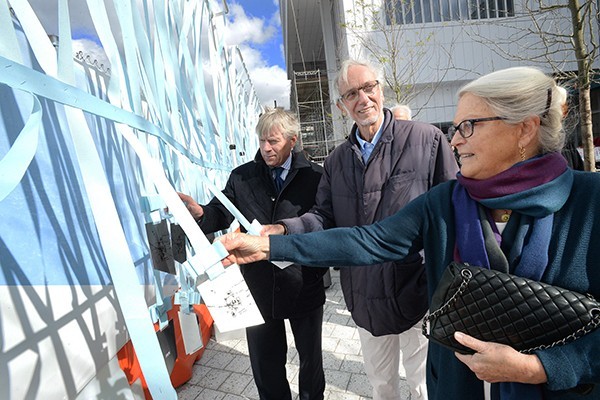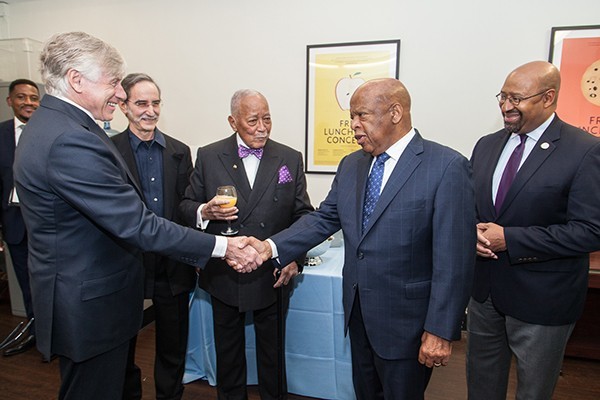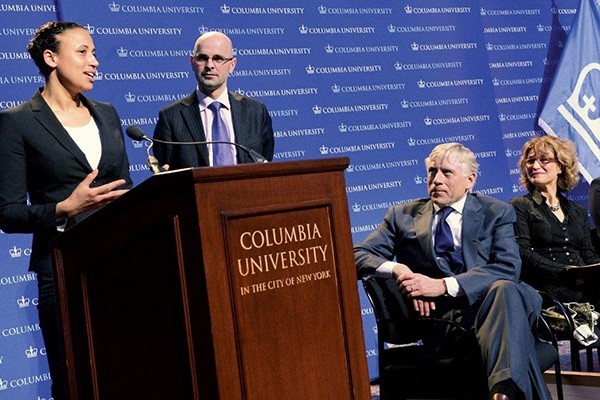Lee C. Bollinger has announced that he will conclude his service as Columbia’s president at the end of the 2022-2023 academic year, bringing to a close a historic era for the 268-year-old university that has brought extraordinary physical and intellectual transformation.
During his two-decade-long tenure, Columbia has flourished as a center of academic excellence that is redefining what it means to be a great research university in the 21st century. In service of this mission, President Bollinger has pushed for a thoughtful approach to global engagement, spearheaded record-breaking capital campaigns, and overseen the university’s most ambitious physical expansion in more than a century.
In an e-mail to the Columbia community, Bollinger wrote, “I cannot begin to express what it has meant to me to serve in this role for this magnificent University for over two decades. Certainly, it has been a defining experience of my life. It has also been an especially high pleasure to do so at the beginning of the new century and in a period of rising intellectual excellence across the institution. No university in the world is more committed to the life of the mind or possessed of the will to bring knowledge and ideas to the service of humanity.”
Bollinger is Columbia’s first Seth Low Professor of the University, a member of the Columbia Law School faculty, and one of the nation’s foremost First Amendment scholars. He is also a longtime advocate for diversity in education and believes strongly in the constitutional right of colleges and universities to engage in affirmative action in admissions.
In a message to the community, Board of Trustees co-chairs Lisa Carnoy and Jonathan Lavine shared their thoughts on Bollinger’s legacy: “Building knowledge, creating space for the exploration of new ideas, and examining what is needed for the betterment of future societies are just some of the themes of Lee’s tenure. But at heart he is an educator, and every new building project, academic initiative, and fundraising campaign that he undertook was in service of creating a world-class environment for learning and teaching.”
Building on core strengths
When Bollinger assumed the Columbia presidency, the university was already a world-class research institution with a thriving liberal arts program. Under Bollinger’s leadership, Columbia has built on its existing strengths and expanded into new areas. The institution has invested in the arts and sciences and the celebrated Core Curriculum, which introduces undergraduates to influential books and ideas in literature, philosophy, science, history, and music. It has also prioritized university-wide and cross-disciplinary work, in all fields, that approach teaching and research in novel ways.
New initiatives have been created or expanded to realize these ambitions, including those devoted to data science, neuroscience, the arts, cancer research and care, the humanities, journalism, and precision medicine. Government funding for research, including from the National Institutes of Health and the National Science Foundation, has grown considerably. Columbia has also renovated or expanded 2.8 million square feet of teaching, research, and other educational space on the Morningside Heights and Medical Center campuses.
These efforts have been supported and led by a dynamic and diverse array of faculty and administrators across Columbia whom Bollinger has recruited or elevated. These individuals are leaders in their fields who have devoted their careers to scholarship and teaching that engages with the problems of the world and prepares students for the challenges they will face. They have helped the university continue to attract exceptionally talented and curious young people from diverse backgrounds across the world who are training to lead in the years and decades ahead.
Ambitious beginnings
Bollinger was inaugurated on October 3, 2002 on the steps of Low Library on Columbia’s Morningside campus. In a speech to the university community gathered there, he shared his vision for the future of what he called “the Quintessential Great Urban University.”
He spoke about the need to engage more deeply with the world while retaining the distinctive academic character of the institution. He reflected on the university’s long and proud traditions of world-class research and liberal arts education. He discussed the rich and dynamic history of Columbia’s neighbors in Upper Manhattan and the university’s plans to strengthen its ties with them. He reiterated his commitment to educational diversity, to ensuring that Columbia’s students, faculty, and staff reflected the city and the world of which they were a part.
And he announced his intention to expand the university’s physical footprint in New York. He explained that for a great research university like Columbia to grow and thrive as a hub of new knowledge and transformational innovations across disciplines, it needed the space to match its ambitions. Over the course of the next two decades, this vision and these goals would shape Columbia’s future.
A university engaged with the world
Bollinger has long argued that for universities to succeed in the 21st century, they need to be more international in their outlook and physical presence and more engaged with the problems facing our global society. He saw a leadership role for Columbia in both.
In contrast to the many institutions that built branch campuses in countries around the world, Bollinger favored the creation of global centers. These small and flexible outposts would allow faculty and students to be physically present abroad to study and work, with the expectation that their experiences would inform thinking on Columbia’s campuses in New York when they returned. The university has opened nine Columbia Global Centers in Africa, Asia, Europe, and South America. It has also introduced new initiatives devoted to exploring global discussions and scholarship, including the World Leaders Forum and the Committee on Global Thought.
In response to the escalating need for colleges and universities to do more to bring their resources to bear on the problems facing humanity, Bollinger and Columbia have invested in initiatives and ways of thinking about the world’s great challenges. Bollinger has said that this kind of engagement must be a distinct and central purpose, essential to the institution’s larger mission. He calls it the Fourth Purpose of the university, in addition to scholarship, teaching, and public service.
Deep and thoughtful work and discussions on this subject have yielded remarkable results in recent years. Columbia World Projects was announced in 2017 with a mandate to partner with governments, organizations, and businesses to translate the university’s research and scholarship capabilities into tangible benefits for people around the world. In 2020, Columbia announced the creation of the Columbia Climate School to deepen, expand, and centralize institutional efforts to address the climate crisis.
A new campus with a bold vision
Central to Bollinger and the university’s vision for the future was a plan to expand Columbia’s constrained physical space. Careful deliberations resulted in a proposed campus spanning 125th Street to 133rd Street along Broadway to 12th Avenue in West Harlem, in a former industrial neighborhood called Manhattanville.
As efforts pushed ahead, Columbia formed advisory boards for residents, students, and faculty and expanded its office of community and government affairs to help guide the approval processes and address the needs and concerns of neighbors. In 2007, the New York City Council approved the plan to rezone the area for mixed-use development so construction could begin.
Critical to this process was the creation of a Community Benefits Agreement (CBA). Included in the agreement were a $76 million benefits fund, $20 million in non-monetary services, including the use of university facilities, and guarantees to contract with minority-, women-, and locally-owned (MWL) businesses and workers for construction. The CBA also included an affordable housing fund, legal assistance for housing, a community scholars program, and dental services for young children.
Two architectural firms, Renzo Piano Building Workshop and Skidmore, Owings & Merrill, partnered to create the master plan for the new campus, which outlined the first buildings and the overall design. The Manhattanville campus would be open and inviting to neighbors and passersby, embodying Columbia’s aspirations to be more connected to the world beyond the academy.
In 2017, the university opened the first two buildings, the Jerome L. Greene Science Center, home of the Zuckerman Mind Brain Behavior Institute, and the Lenfest Center for the Arts. The Forum, a multi-use gathering venue, followed in 2018. In January 2022, the first phase of construction ended with the opening of Henry R. Kravis Hall and David Geffen Hall, the new home for Columbia Business School.
Advancing diversity in higher education
As president of the University of Michigan from 1996 to 2002, Bollinger led the school’s civil rights litigation in Grutter v. Bollinger. That landmark decision for the first time upheld the constitutional right of colleges and universities to consider race as a factor in admissions to advance diversity in higher education. Bollinger believes deeply in the value of cultural, socioeconomic, and racial diversity to American society. He has written and spoken frequently about his advocacy on these issues in opinion columns, interviews, and public appearances, and will publish a book this fall that addresses affirmative action and its legal history.
To further Columbia’s institutional commitment to educational diversity, Bollinger and the Office of the Provost have made monumental investments in faculty diversity initiatives. Since 2005, the university has invested $185 million, the largest public commitment made by an Ivy League institution to support faculty recruitment and development. In 2021, Bollinger announced that the work yielded the most diverse group of new tenure and tenure-track faculty in Columbia history. Bollinger has also transformed the leadership of the institution through his appointment of record numbers of women to deanships and other high-level positions.
In 2020, the murder of George Floyd intensified this work as Columbia strove to deepen its commitment to antiracism through a university-wide review. That review has been focused on inclusive public safety; addressing the impact of racism in our surrounding communities; symbols and representations on campus; student inclusion and belonging; faculty diversity; the staff experience; initiatives at our schools and institutes; and antiracism in health care at Columbia University Irving Medical Center.
Promoting the free exchange of ideas and information
As president, Bollinger has been responsible for a flowering of initiatives devoted to the free exchange of information and ideas at Columbia. In 2014, he established Columbia Global Freedom of Expression, and in 2016 he announced the creation of the Knight First Amendment Institute and Columbia Global Reports. He serves as a member of the Pulitzer Prize Board and is a former director of Graham Holdings Company (formerly The Washington Post Company). The university is home to the Pulitzer Prizes and to the celebrated Columbia Journalism School.
Bollinger is the author or co-editor of many books on the First Amendment and freedom of speech and press. The most recent include National Security, Leaks and Freedom of the Press and Regardless of Frontiers: Global Freedom of Expression in a Troubled World. In addition to the affirmative action book, a book on social media and free speech is forthcoming. Each fall semester, he teaches “Freedom of Speech and Press” to Columbia undergraduates.
Investments in Columbia’s future
These achievements and investments in Columbia’s future have been made possible by monumental fundraising efforts during Bollinger’s tenure totaling more than $13 billion. Highlights include the Columbia Campaign, a nine-year university-wide endeavor that concluded at the end of 2014. Donors gave to support undergraduate research education, student advising, athletics, and financial aid across Columbia’s schools. They also endowed hundreds of professorships in the Arts and Sciences and around the university. Capital funds were raised for Hamilton Hall and the Northwest Corner building on the Morningside campus, the Campbell Sports Center at the Baker Athletics Complex, and the first buildings on the Manhattanville campus.
In 2017, President Bollinger announced the Columbia Commitment campaign to support the university as it continued to adapt and evolve to meet the demands of an ever-changing world. The generosity of the nearly 200,000 donors who contributed has facilitated remarkable developments. Loans have been replaced with scholarships for medical students who qualify for aid. Historic sums have been raised for cancer research and care. The African American and African Diaspora Studies Department has been established. The first students have enrolled at the Columbia Climate School. And Columbia Business School has opened its new home on the Manhattanville campus.
Thanks to the Columbia Commitment, financial aid and scholarship funds have increased dramatically. These efforts will be carried forward by the Columbia Student Support Initiative, a university-wide plan announced last year to expand access and reduce student debt by raising $1.4 billion by 2025.
Looking ahead
When Bollinger concludes his tenure as Columbia’s president on June 30, 2023, he will continue to teach at the university and pursue his research and scholarship full time.
In his email announcing the end of his time as president, Bollinger thanked his wife, Jean, “whose contributions within and through Columbia have been many, whose life as an artist has been made at times somewhat more difficult by mine, and whose very existence makes me a better person.” The Columbia community is deeply grateful to Jean as well.
Looking ahead to the future, Bollinger added: “Columbia is notably agile, creative, fresh, and experimental. I am certain that the conditions are present for an even more brilliant future in the decades ahead. And I will leave confident that our potential and aspirations will be realized.”
This article was adapted from the Columbia News story "President Bollinger to Step Down in 2023."
